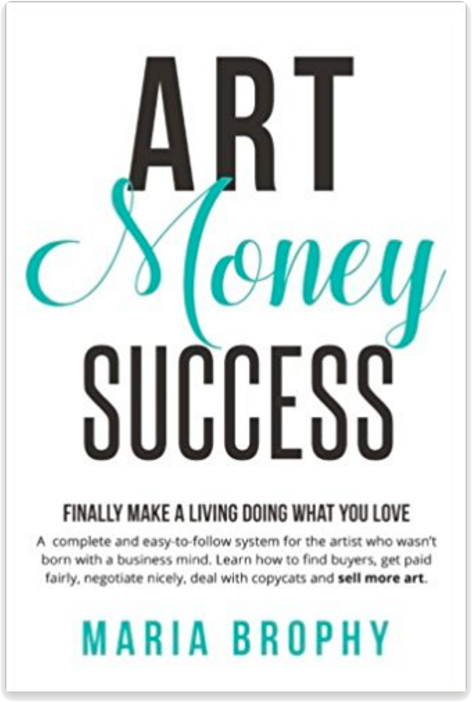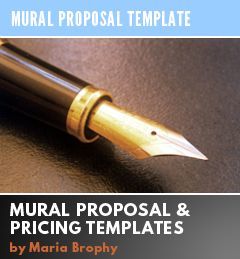 Photo Credit: Noah Kalina
Photo Credit: Noah Kalina
“A verbal contract isn’t worth the paper it’s written on” Samuel Goldwyn
A friend of mine is quite famous in Europe. He signed an Exclusive contract for with a large company that licensed his art for clothing. It was a hit in Europe, and fat royalty checks were rolling in.
He made so much money that he got himself a new wife and a nice little mansion on the beach. For a few good years he lived the high life.
That is until early 2008. One day, the checks just stopped coming.
His European licensee went bankrupt. The money never returned. He lost his home. He was devastated financially. He had to start over again.
(To learn about art licensing: sign up for my FREE ten week series called “ART LICENSING MADE EASY” which teaches how to license your art, negotiate contracts and know what to charge $$$. SIGN UP HERE! )
Why didn’t he just sign up with another licensee, you might wonder? He was very popular – it would have been so easy for him to sign up with a new company and do the same thing.
He legally could NOT do any more work in Europe because of two reasons: 1.) He inadvertently SOLD his name, trademarks and copyrights to the company that went bankrupt; and 2.) He can’t cancel the contract because it doesn’t have a “get out” clause.
Basically, he signed a bad contract, and it’s cost him everything. (He admitted to me later that he never bothered to have an attorney look over the lengthy contract the company had him sign.)
Something like this is extremely rare, however, I never want to see this happen to you! So I’ve put together a partial list of Red Flags to look out for in a contract.
DISCLAIMER: I am not an attorney. But I do know a lot about art licensing deals. When I consult artists on deal-making, I share my many years of experience but always advise them to talk to an Art Licensing Attorney for answers on contract law. This information I share comes from years of negotiating deals with Licensees and clients and working with attorneys.
I’ve put together more deals and contracts in the last ten years than most people ever do in a lifetime. My experience, mistakes and triumphs with deal-making has enabled me to help others with their contract-anxiety.
Sometimes the hardest part about being a creative entrepreneur is putting together the deals. There really is no one road-map to follow. Each contract is different from the other.
But there are a few contract terms and concepts that are the same from deal to deal.
There are certain red flags to look out for in any contract. There are also necessary terms/clauses that should be in every agreement you sign.
Many companies are using outdated, antiquated language that no longer is used in the real world. Most of the time they don’t even know WHY something is worded the way it is.
So don’t be shy to tell them that you will sign the contract once they make the changes you require. Literally EVERYTHING is negotiable, especially contract language.
In the end, most of your clients are going to want you to be happy, too.
The contract phase is the most important start to a relationship – it’s where you both draw the line at what you’ll give and what you ask for.
Once you get all of that down on paper, you hopefully never have to look at the contract again! (And if you do, it usually means trouble.)
Here’s my personal list of RED FLAGS that give me goose bumps:
TRANSFER OF RIGHTS: Unless your business plan includes selling the rights to your art outright (some illustrators do this), NEVER transfer your copyright ownership. Retain ownership to all your copyrights. Once you transfer your rights to any image, you can’t get it back. Not even for that coffee-table book you plan to publish about your work when you’re old.
REMEDY: Ask the client to replace the “TRANSFER OF RIGHTS” language to a statement that says “GRANT OF RIGHTS”, where it’s clear that the Artist is granting rights, but retains all ownership to copyrights.
LONG TERMS: I’ve seen contracts that have as much as a ten year term! That’s just too long. A typical licensing contract is one or two years. (If you like each other, you can always renew)
REMEDY: Ask the client to lower the contract to two years. That is a very reasonable amount of time.
AUTOMATIC RENEW: Some contracts are for a certain period of time, say 2 years, and the term listed in the contract states that it automatically renews for another 2 years unless either party gives 60 day written notice. (Or something along those lines.)
Who in the world is going to remember to cancel a contract, almost two years into the future? Sure, you can put it on your Google calendar, but what if something goes wrong with that? Then you’re stuck for another two years without a chance to cancel.
REMEDY: Ask the client to limit it to a specific time period (ex: June 1, 2011 to May 31, 2012). And tell your client “If, at that time, we both want to renew, we can do so with an amendment to the contract.”
WORLDWIDE: Some companies will want their license to be granted to sell worldwide. It’s extremely rare that a company sells their product in EVERY COUNTRY IN THE WORLD! No contract should have the territory of WORLDWIDE unless they’re Coca Cola.
REMEDY: Ask the client to give you a list of countries where they are already selling the product, and then replace the word “WORLDWIDE” with their list (Example: “Territory: North America, Canada and the Virgin Islands.”) This leaves you free to doing a similar deal with a company in other territories.
EXCLUSIVE: BE AWARE OF THE EXCLUSIVE!
One of my consulting clients showed me a license agreement he was about to sign with a publishing company. It had a sentence that said that the agreement was Exclusive, World Wide, for all products!
Now, it’s literally impossible for a company to make EVERY SINGLE PRODUCT available, and in EVERY COUNTRY IN THE WORLD! Turns out, this particular company only sells in the U.S., and not in large quantities.
REMEDY: Ask the client to change the wording to Non-exclusive, and have them specify the actual products that they are making (i.e. canvas art prints or bobble heads or mohair sweaters, etc.).
If my artist had signed this agreement the way they had it worded, it would mean that if a large Australian print company approached him to sell his prints in the South Pacific, he would have to turn them down, and that severely limits his ability to earn more money from his art.
ALWAYS THINK TWICE BEFORE SIGNING AN EXCLUSIVE. It can be extremely limiting. Often, companies asking for an exclusive don’t even know why they want it. But it can seriously hurt you and future sales of your art.
*Caveat: I have this discussion with seasoned artists and some do sign exclusive agreements, for very narrow definitions of product lines. There are exceptions to every rule, and you should just be aware of what you are getting yourself into before signing.
Reasons NOT to sign an Exclusive Agreement:
LOSS OF INCOME TO THE ARTIST: There’s no guarantee that they’ll do a good job of selling your products and you may not make much from the deal. In the meantime, you’re not able to go into a deal with anyone else that could be paying you.
Most large companies, experienced in licensing art, understand this concept. When we went into a deal with the huge company Converse, they didn’t even ask for an exclusive. I find it’s usually the smaller companies that try for the exclusive, not understanding why it’s a bad deal for you.
BANKRUPTCY: Bankruptcy law in the U.S. requires an exclusive agreement to be considered an “asset” of the company who goes bankrupt. This means that if your Licensee goes bankrupt and stops paying you, you are still held hostage to the exclusive agreement – you aren’t able to cancel the contract and work with any other company. (We once signed on with the 3rd largest toy company in the U.S. – they went bankrupt 1 month later. Luckily, we didn’t give in when they insisted on an exclusive.)
In some cases, I’ve had a Licensee STRONGLY insist on an exclusive. Usually it’s because they don’t want you going to their competitor with the same designs or art.
When a client vehemently opposes a non-exclusive, I ask them a lot of questions to fully understand what their issues are, and then try to find a way to give them what they want while protecting my needs.
In other words, I get creative and find a way to give them what they need to feel secure, while not giving up my ability to earn money elsewhere.
Once we did a deal with a rather large boot company. They were putting a lot of money into Drew’s program, and wanted assurance that we wouldn’t take the designs to a competitor. That was a reasonable concern, so to ease their minds, we signed an agreement that specifically stated: “Non-exclusive. Artist agrees not to license the designs named in this contract to competing sheep-skin shoe companies for a period of one year.” We were very specific, which made us happy, and we gave them what they wanted, which made them feel good. Everyone wins!
TWO GOOD REASONS I WOULD SAY IT’S OKAY TO SIGN AN EXCLUSIVE:
1.) IF THEY ARE PAYING A HANDSOME GUARANTEE: In the licensing world, a guarantee means that you will be paid a specific minimum dollar amount in royalties, regardless of how many units actually sold. A guarantee is usually included in a contract that’s exclusive.
Example of a Guarantee: Minimum of $15,000 per quarter is payable to Licensor (the artist). This Guarantee means that we get paid a minimum of $15,000 (or insert any number you wish) no matter how many products are sold (even if none are sold).
Asking for a guarantee usually inspires the client to change “exclusive” to “non-exclusive” in a hurry. After all, they don’t want to be on the hook for that much money should the product not sell in the marketplace.
And on our end, we don’t want to be tied to an exclusive contract should the Licensee not sell large quantities.
2.) IF THERE ARE SPECIFIC LIMITS IN THE CONTRACT:
If you agree to an exclusive, you should very narrowly limit the following:
- The term should be as short as possible (i.e. one year)
- The Product should be as specific as possible (i.e. Long sleeve sweaters made of mohair)
- The Territory should be very specific (i.e. East Coast of North America – or wherever they are actually selling)
WHY? Because the more specific you are, the freer you are to go into other deals. After all, you’re in this to make money, right? You don’t want to tie up your possible income streams by giving an exclusive for items or a territory that a company isn’t even engaged in.
NECESSITIES IN A CONTRACT:
If there’s one important thing in a contract for you to know about, it’s this:
Always have a “GET OUT” Clause. Now, “get out” clause is not the proper legal name, but it’s what I call a way out of a contract!
The “get out” clause should allow you to cancel the contract with a thirty day notice for the following reasons:
- The product is not sold in commercially sufficient amounts (thus you aren’t making enough money)
- The Licensee sells their company (you don’t know the new owners – you can always sign on with them later)
- The Licensee has not paid you on time or at all
- The Licensee has been seen in poor light in the publics eye (i.e. Toyota with their failed brakes)
- The Licensee breaches the contract in any way (i.e. they don’t pay you on time)
The most important one, though, is the first one. If they aren’t paying you enough, it’s a good reason to cancel the contract.
APPROVAL OF PRODUCT: The artist should always require that they give approval of the samples of the product before it’s made available to public.
SAMPLES: Artist gets samples (you choose how many) of each product produced. They should be shipped directly to the artist – shipping paid for by licensee.
SIGNATURE: Artists’ signature and/or logo should legibly appear on each product and packaging, in a manner required by the artist. (Spell out how you want it to look)
There is so much more, but these are the first things I think about when looking over a contract or license agreement.
I hope this is helpful, and please print this out and save it for the future, should you find yourself in the position of having to navigate a licensing contract.
My number one advice, though, is this: Hire an attorney that specializes in Art Licensing (do NOT hire Uncle Bob who does business contracts) – and have an art licensing template made up for yourself. It will cost you about $500 – $1,000 initially, but once you have it, you can use that template again and again for all of your licensing deals. In the long run, it will save you time and money. You MUST invest in yourself if you are going to find success!
OR, buy the Artist’s Short Licensing Agreement Template PACKAGE, which gives you a template to work with and is a great start for an artist just getting into licensing, who isn’t ready to spend the money on having an attorney draw up one for them.
If you have ANY deal-making or contract questions AT ALL, ask me in the comments please. I’ll do my best to answer.
Here’s to our success!
Maria xxoo
PS: I provide consulting for artists and I specialize in deal-making and navigating art licensing. For more information, click on my consulting page.
My goal is to help each of my artist clients to learn to feel confident with deal-making and going into contracts.
NEW: Would you like your own licensing agreement template that you can use again and again? My LICENSING AGREEMENT/CONTRACT TEMPLATE PACKAGE is now available. This package makes it easy for you! Complete with a template that you can change as needed, and instructions, this is the perfect short, simple agreement for artists not yet ready to hire an attorney. More details here: Artists Short Licensing Agreement Template
To gain a strong understanding of Art Licensing, what to charge, how to protect yourself in a deal, and so much more: Check out my online Art Licensing Courses:
ART LICENSING 101 – an Introduction
ART LICENSING 2 – You Get your Next Deal
ART LICENSING 3 – Pricing, contracts and templates (everything you need to seal the deal)
These courses and templates will save you years of experience, time & money. It will prevent you from getting into bad deals and show you what’s reasonable to ask for. You’ll feel more confident going into each deal with this knowledge. It’s truly a must-have for all artists who are licensing their art!
.















79 Responses
Thanks for such valuable tips! I will print, laminate and save :’)
Great article, Thanks Maria!
Thanks for the comments, Jerry & Allyn! Glad it’s helpful to you. Let me know if you have any follow up questions. Like a nut, I love this stuff!
Hi Maria
Great reading. I wonder if you have advice for UK artists contracts? or maybe a recommended publishing attorney/solicitor here in the UK?
Kind regards
Anne marie
Thanks Maria -great advice as usual!!
In the ‘get-out’ clause category, my atty tells me that a statement that, if the co files bankruptcy, the contract is breached and ends, and any rights or privileges are not transferable, is a good idea, too.
Walter, thanks for your comment. All of the attorneys I’ve talked to have said that when you have an Exclusive agreement, the contract cannot end because of the way the bankruptcy laws are structured. EVEN IF the contract states that it’s “null and void due to bankruptcy”, the artist is still held to the contract. I agree- this does not make any sense at all, but it has to do with assets being seized, etc. This is the reason many licensors choose to not go exclusive.
I always love the detail you go into in these helpful posts. Thanks.
So supremely useful! Thanks for the tips, Maria! Will definitely keep this bookmarked, laminated and framed 🙂
Maria,
Thanks for the insight! Very helpful!
re the bankruptcy point always ensure that you have a right to terminate the contract if the licensee files for bankruptcy (or is the subject of a creditors application for such);whether or not you can “recover” the licence will depend on the timing of any termination notice,and ultimately what happens to the company concerned-remember insolvency can involve restructuring, not just liquidation, and the insolvency proceedings can include renegotiation of key assets (such as your licence) and the payments that are due under that licence.Its always hard to spot but warning signs such as late payment (another good reason to terminate),lay offs etc are often good indicators that something is going wrong and may give you teh chance to exit before the insolvency process kicks in.
those reasons for the out clause are great. often bankruptcy is in the terms of standard contracts, but adding that the company is sold, or has not paid on time does add more protection.
thanks for the info
Thanks Maria this has been truly useful! Due to my lack of experience I never realised the importance of signing an exclusive deal or have the companies specify the countries they trade in. I’m an international artist and such deals can truly have an effect on income, always good to know what to look out for.
Maria, As always your biz articles are the best. This article is printed out and is sitting with a copy of a licensing contract sample that I have been studying. You have so much valuable information….when are you going to write a book for us to buy?
Thank you for a well written article.
Funny you asked, MaryLou – I’m working on a book on art licensing contracts right now as we speak!
Very helpful and well written article.I see that you are a consultant- are you also an agent for artists seeking representation?
Teri, thanks for reading my post. Yes, I do consulting but I do not represent other artists (besides my artist husband). I prefer to help artists learn to handle the business end themselves. It saves them a lot of money that way!
I was approached by a company during an art fair concerning my photography. They want to sell my work to their clients. They do have one exclusive term, if they are representing or selling one of my images, then they want to produce them. So I can sell to whom ever I choose, but they have to print the actual piece. I am also trying to determine what is a decent rate for royalties for this. I believe they said 18%. These pieces would be printed very large and placed in hotels and resorts. It seems like a venture to try, but still waiting on the contract before I decide.
Maria, As always great information!
Hi Maria,
I just came across your website and I think it’s a treasure – it has so much valuable information.
I’ve been approached by a licencing company from US and they have all “Red Flags” in they contract. Thank you again for your information.
Great post, I have one question and any help would be very helpful, I was presented contract (I should be providing graphic assets for project). Company asks for owning all rights, titles, interest (including rights, copyrights, trade secret rights, sui generis database rights and all other intellectual and industrial property. Work authorship, designs, know-how, ideas.. it feels pretty extreme, is this normal wording?
Rave, thanks for the comment. To answer your question:
There are 2 ways to sell your work to a company. One is to license it. This is where you grant them limited rights too use the art, but you keep all ownership and copyrights.
The other way is to sell the art, outright to them. This is where they get all copyrights to the art, and then you cannot use it for anything else ever again.
This company wants all rights from you – and that’s okay if you agree to it. Usually the price is 3x as much when selling the work outright.
You have to decide what’s best for you. There is no right or wrong way, just the decision as to what your business model will be.
I hope this was helpful!
Great post, great information. I have a question one manufacturer wants to create a brand with my images and make a line of products with them. But he doesn’t want to make a licensing deal e wants to make a partnership with me. I make art and he produces and do everything to put the product on the market. I already ckeck him out and he has the best references and i already went to his place to see how he works. I’m still waiting for his offer, but i don’t have a clue what percentage should i ask in this case. Thanks for your help!
Monica, this could be a wonderful opportunity for you! I strongly recommend that you not only get paid a royalty percentage, but also design fees up front (so that there is a cash flow to you while you’re doing the work). Also, your agreement should state that you keep all copyrights. This is a situation where you absolutely should hire an attorney to assist with the deal.
Maria thanks so much for your advice, this can really be a great opportunity!
Xoxo
Hi Maria, Here is the offer from that manufacturer that i talk about the other day. He wants to make a brand and a company with my art. I will own 30% of that company and a salary each month. Alarm is ringing in my head! I see all the red flags that you tak about.. If i agree, i’m loosing my art forever! I’m thinking well, don’t you agree?
Monica, the question is how do you feel about going into business with this person? Are you interested in making art, or running a manufacturing business? These are important questions to ask. As a business partner, you would do more than create art; you would have to invest money and time and be on the hook for legal issues. You have to decide how passionate you feel about this business. If the idea of being a partner is exciting for you, then do it. But if you want to focus on creating art and having your own art business, then insist on a licensing deal instead of a partnership. There is a lot to this, so you will have to invest in working with a consultant or an attorney, someone who specializes in the business of art.
Thanks so much Maria, I’m going to offer him a licensing deal, I think it’s the best way for me.
Maria,
I am sure you read this a lot, but your advice and tips have enriched my mind. I am blessed to have found this website.
I have been creating art work for a lifetime, but just recently started my business. I was almost burned badly just the other day by a company that wants to start a whole brand of clothing line with my designs. They wanted exclusive lifetime use (I said no) and no royalties and because i was “new” to the business. They offered me a very insulting price per image. I walked all because I read and learned from this website.
What is your process for training and equipping artiest to handle their business end ?
Thanks So Much!!!
so im an artist and i dont know much of anything about contracts . is it okay to email you the contract this guy wants me to sign? he wants to be my manager .
Ventage, yes, I can help. Please go to my consulting page, and follow the instructions on how to set up a consultation for a contract review: https://mariabrophy.com/consulting Thanks!
can you explain if this clause is standard
The Artist agrees that to the extent any of the Intellectual Property and/or the Designs are used as part of the Products, such Products shall, to the extent permitted by law, be a “work made for hire” within the definition of Section 101 of the Copyright Act (17 U.S.C. § 101), and shall remain the sole and exclusive property of Company.
The “work for hire” worries me a little
Bev, I’m glad you asked! The language that you shared mentions “Work for Hire” – this term means that you are handing all rights to the art over to your client. If you don’t agree to give them all rights, ask them to remove that language and replace it with language that will give them a license to use the art, but you retain ownership to all copyrights.
Yes, I am sorry, maybe I did not state my question properly, I know what the term “work for hire” means but what does it mean when it is used in this clause below. Is this a standard clause in a design agreement.
Section 2.3 is intended to protect the licensee using the artist’s work from any claims that the artist owns the legal rights to the finished product. The artist still retains full ownership over the original designs, but the licensee owns the finished product. In the case of an ownership dispute, the licensee can use this section in support of its argument as proof that the parties agreed to classify the work as a work for hire.
thank you
Hi Maria, Thank you for this great article! What happens if someone wants to sell my art as digital files? Anything specific I should know about or include in the contract in this case?
Also – when signing a licensing contract, how can the artist keep track on the actual sales of the products and know what the royalties he/she received are based on? Do companies send sales reports? Anything specific the artist can ask for? Thank you!
Hi maria, I won a art contest to have my art printed on shirts for a festival and 500 dollars. Now the contract I signed was titled transfer of copyright and reproduction. I was fine with that but now they refuse to return my physical origal piece of art. Their call to artist poster stated that they except digital submissions. So I assumed in good faith that it would be returned after they took a high resolution photo. Isn’t this theft in the art world? I demanded it back but they threatened to “pull it” if they had to return it. Mind you this was not in the contract I signed. Please help.
Nicole, so sorry to hear about this! This is why I am very much against entering art into contests. There is little to no benefit to the artist, and often it harms them instead of helps.
If your contract with them does not state that they keep the original, then they must return it to you immediately.
Let them pull it and terminate the contract. It won’t do you any good anyway. Get your art back and be very careful in the future with whom you do business with.
I’m sorry you’re dealing with this. Makes me mad that artists are taken advantage of like this.
Thank you so much for such great information.
Thank you for all your helpful advice. I find you very knowledgeable. I have a contract with one print company but I would really like to diversify. Problem is I don’t know how to find a print company or how to approach them. (Current print company fell into my lap). I can’t afford Surtex. So I’m wondering, if I hired you as a consultant would you be able to provide me with info about appropriate print companies to approach? And depending on how much time we had help with knowing how to approach them.
Thank you. 🙂
Dear Shiela, there are many ways to find print companies. One is to walk into stores and look at the company name on the back of art prints. Another is Google search.
I could help you, but your money is best spent having me help you with putting deals together and negotiating contracts. You can find manufacturers on your own for much cheaper! I highly recommend buying Tara Reed’s book How to Find Manufacturers to License your Art, here: http://bit.ly/FindManufacturers I hope this helps!
Thank you for all the helpful advice.
I am now reviewing a license agreement and I’m feeling like I keep going back and forth the pages trying to decipher some points so I was wondering if you could give me some tips.
1. “the exclusivity of this licensing agreement only applies to the designated products category indicated on page x…” and then it says “licensor shall not grant any person a license similar to that set forth in section x or any right to use the images in any manner whatsoever”. So does this mean the images I’m licensing are exclusive to them (art print company) and I cant for example license it to an apparel company?
2. Regarding the terms listed, where it’s talking about the licensed images it also says “images mean the artwork including without limitation all copyrights and intellectual property relating thereto”.
Does this mean I’m transferring my copyright ownership? Should I ask for a “licensor retains all copyrights in and to the images”?
Thank you so much in advance.
Hi Sofia, with the exclusive language, it sounds like they are including all possible uses. Ask them to remove “licensor shall not grant any person a license similar to that set forth in section x or any right to use the images in any manner whatsoever” because this contradicts the “only applies to the designated products…..”
I’m not sure that the 2nd part means. Ask them to clarify it for you, or to add language that states that the Artist retains ownership to copyrights.
Reviewing contracts and negotiating gets easier with time. To be sure, you might want to consider hiring an art licensing attorney to review and advise you on the contract.
Thank you Maria, I’m going to try to negotiate it myself but if I see it’s getting complicated I think I might ask for help.
Hi Maria!
How wonderful to find you in my search for help in royalties / licensing help!! THANK YOU for all your help!!!
My Question is:
So far I can say I am pretty clueless about copyright agreements of any sort. Asside from what I read here and maybe a few less detailed sources online.
I am a graphic designer and I have a customer who sells a special type of pictures for homes.
I was asked to design a new line of artwork for them to sell. It is a very specific line that will be designed for their very specific niche. Therefore we thought it may not make much sense for me to want to sell it and compete with them.
They are also a pretty small company, not such big budget yet, and the new line is an attempt to break into a new market so there is no clear idea of what quantities sales to expect.
Do you think that in this case I should work on “work for Hire” basis and give all rights over the artwork to the customer (maybe just add a note allowing me a few copies and the right to use the artwork for personal use like portfolio etc.)?
Or as a flat fee license for a year or 6 months to see how sales work and then adjust the fee?
Can you also advice about how to price that flat fee? Is there any sort of industry standard..?
Thx so much again!
Dear Sarah,
Thanks for the question – I wouldn’t do a Work for Hire unless they are paying you very well for all rights, and it doesn’t interfere with your future goals as an artist.
I could help you with the specifics of pricing – it all depends on many different factors, and I would need all details to give you suggestions. You could set up a call with me to do this – please check out my consulting page for details on how to set up a call.
Thanks!
I am a content creator who is seeking to make a “fan art” book of characters from my creation. I want to allow interested parties to create artwork of my copyrighted characters for the purposes of making an art book to sell. They would draw my copyrighted characters however they like and I’d compile them into a book I can sell. I’d like to be able to use their art of my characters any way I want while still granting them their rights for the work but limiting how much money they can make from my copyrighted work.
In short, if they want to make their own art book with samples of their work, and include the one or two pictures they designed for my art book, I’d be happy to let them do that. I don’t want them creating an entire book of art or selling mouse pads and coffee mugs based on my copyrighted characters, though. I also wish to be able to sell t-shirts or other merchandise with the art they made of my copyrighted characters indefinitely and royalty-free, making sure they get full attribution and exposure for the work they did for me.
What’s the best way to make sure I don’t step on their rights while securing the right to use their art for profit purposes? I figure if an artist objects to me wanting to do that, they just don’t send me any art. If they choose to offer to send me art, I get them to sign an agreement like the one above and then they send me their art.
I found someone else’s license agreement that does exactly what I want. Is it ok to use theirs but change the info to match my organization name and so on, or is that illegal to borrow someone else’s license agreement and modify it for your own use?
Sorry for such a verbose post. I’ll understand completely if this is too much for you and you’d rather not answer it all.
Thanks for offering to help people. You’re very kind. 🙂
Hello, I have one question… I am European citizen and recently I´ve worked with USA citizen. Question is, where do I pay taxes? My state has agreement about double taxes with USA (thus taxes are paid only once). I was working from Europe whole time, do I have to pay taxes in USA or can he send me money without witholding and I will approach it as normal income? Thank you in advance.
Thank you for all your great insight! I have a mural that is at a private studio lot where lots of filming and photoshoots go on. I have had to sign several releases so far for productions to film in front of my mural. I have a deal right now with a jewelry company wanting to use some photoshoot images on their website and in stores across the U.S. and Canada as part of their signage. I am wondering what is a fair price to ask for them to use the images. We already agreed on a price to use them online and now we are trying to figure out the in stores marketing element. The images hardly show my mural in the background since the focal point is the jewelry on the model. Do you have any insights on what is fair to ask?
Thank you for the informative articles.
I received a contract for non-exclusive licensing where they are presenting a set of images to a client, one of mine included. ( So don’t know yet if it will be chosen.) Will pay me one flat fee to license the image for printing one or more times for that client. My red flag question: they are asking for the high-res image up front. This doesn’t seem right to me, to hand over hi-res image without knowing if it will be chosen, & more importantly without being paid. (Not thrilled that it’s one flat but they may use in several rooms, or one room, too, btw). Is there a situation where this is normal, or am I being scammed?
They don’t need the high res images at this point; I would provide them with images at a good enough resolution to review them, but only send the high res after the deal is signed. If they insist, ask them why. Maybe there’s a good reason, though, I can’t imagine what that would be.
Thanks for your article Maria. I have a client who I am working on bike jersey kits with. The client group is considering to have customized jersey kits by location–as their locations grow in a number of places such as NAmerica, SAmerica and Europe for starters. (one client group member referenced Hard Rock Cafe location Ts and hats as a reference) I’d like to propose a royalty fee but I don’t know how to approach this. I’d prefer to bring this up in the best way possible to reach the goal of some compensation for possible future sales.
Thanks for your article Maria. I will reference the red flags for future contracts. I read this today because I have a client who I am working on clothing attire graphics. The client group is considering to have customized sports jersey kits by location–as their locations grow in a number of places such as NAmerica, SAmerica and Europe for starters. (a comparison of Hard Rock Cafe location Ts and hats was mentioned) I’d like to propose a royalty or percentage for future clothing attire sales. Do you have any thoughts on how to approach this? I’d prefer to bring this up in the best way possible, so the client knows I am not asking for something outrageous rather, something that’s a nominal amount.
Hi Kendra,
Congrats on the opportunity! I would ask for a royalty percentage of 6% with an advance against future royalties paid up front. The up front advance depends on how many images they plan to use, and their projected sales. Good luck! And, if you want specific help, set up a “quickie” call with me and we can brainstorm it together – go to my “work with me” page on my website for instructions on how to set up a call.
I have a client whom we have agreed on a flat fee for use of an image for one year, but now after reading all your information it sounds as if the flat fee is too low. It is a major high end store with many locations and a web site and do no usually do royalties with artists. If it is based on the potential money to be made by them a 5% royalty would be in the several tens of thousands. They usually use stock art and pay a flat fee for the image outright usually $500-$1000. I am conflicted first thinking I was happy with the deal and now feeling taken advantage of. I do want a deal but I’m thinking they could pay 10x their offering. I was hoping you could give me some advise at this point. I have not signed the contract and am wondering if it is too late to renegotiate fee and terms on a PR front.
Hi Dana! Make them a counter offer, tell them that you did some research and realized that your flat fee should be higher, due to their high volume that is predicted. They may not want to do royalties, as it would require a new accounting system to be put in place, and if they aren’t doing it with anyone else, it would be a hardship to do it for just one artist. So, ask them to raise their flat fee amount by 50% and shorten the time frame they can use the image. For example, to 16 months. If, after 16 months the design is doing really well, they can re-license it from you again for another flat fee.
Don’t over-think this too much. These are just guidelines that I share here. Sometimes we have to be flexible and try things out.
So here it is six years after this article was originally posted and I just now find this wealth of information. Thank you very much for all this; and for looking out for all us art types.
Thanks Maria! I’ve just got approached by a company who’s interested in manufacturing my designs. I know NOTHING about this industry and your website so far is very educational and easy to understand. I only have 1 question for now:
HOW DO WE KNOW how much revenues the licensees are making? Do they report us their gross revenues? How can we trust that they’re showing us real numbers? How do they usually show us the sales report? Thank you! 🙂
Hi Cathy – congrats on your new opportunity! To answer your question – we never really know if a licensee is reporting properly. We have to trust, and to trust, we have to make sure we do deals with trustworthy people. And if you suspect that they were giving you bogus reports, you can always require an audit of their books. But, that can get costly. So do your best to only work with people and companies that you trust!
Great Read, thank you!
Just a small question if I may. Can the artist sell a license for the use of his art in a cover of a music album multiple times? I mean can he sell the license to the same painting again to a different music band a few years later?
Hi Jake,
I would never recommend taking something like a CD cover and licensing it to more than one band. Everyone would be unhappy with that. But, you can keep ownership to the rights to the art, and do other things with the art, like sell print reproductions.
Maria, thank you for all of the advice you give! I’m in need of advice for an indemnity clause in my first contract. It’s with a big publishing company and they’re looking to commission 9 small paintings for a deck of cards. The clause says:
With respect to any material We may furnish you (and not written or conceived by you), We shall indemnify, defend, and hold You harmless from and against any and all claims, losses, liabilities, damages, costs, and expenses, including without limitation attorneys’ fees, arising out of or in connection with any breach or alleged breach or failure of any of Our warranties, representations, agreements, or obligations under this Agreement.
This company did confirm that the part “(and not written or conceived by you)” makes me liable as the artist for the commissioned work.
So let’s say I create these commissioned paintings for their product and they’re out in the world. Someone could claim my work to be too similar to their copyrighted work and sue this company, and it would all fall on me since I’m the one liable for conceiving the work.
This company is telling me that this verbiage is standard with every contract they do.
Is this really standard? If it is, then how does any artist create commissioned work for a big company with that risk hanging over them?
Hi Kim,
Yes, it is standard practice for the artist to be responsible in the event of an infringement accusation. Most licensing contracts spell this out clearly – that the artist is liable in the event of a lawsuit over copyrights (if the artist infringed on someone else’s copyrights). I always tell artists to be very careful not to create art that can be confused as someone else’s for this reason. Make sure that the art you license to this company is purely your own.
Hello Maria, Thx for the wealth of information on Art Licensing… I was approched by someone who want’s to use an art piece from my ETSY store to make and sell Tees, mugs, aprons and totes. Being clueless on this subject I found your article. I have a artist license agreement that was online for free and have added some of the things you have listed to it. I don’t have their actual proposal yet but I think you have helped my considerably. the only thing I am confused about are these 2 clauses ” Indemnification: Client will indemnify and defend Artist against all claims, liability, damages, costs, and expenses, including reasonable legal fees and expenses, arising out of the creation or any use of the Images or materials furnished by Client. It is the Client’s responsibility to obtain the necessary model or property releases are ensure they are full effect and in force.
General Law/Arbitration: This Agreement sets forth the entire understanding of the parties, and supersedes all prior agreements between the parties. This Agreement shall be governed, interpreted and enforced in accordance with the laws of the State of California. Any claim or litigation arising out of this Agreement or its performance may be commenced only in courts physically located in Riverside County California, and the parties hereby consent to the personal jurisdiction of such courts. In the event of any litigation arising out of or relating to this Agreement, the prevailing party shall be entitled to recover its attorneys’ fees incurred in the litigation. If parties are unable to resolve the dispute, either party may request mediation and/or binding arbitration in a forum mutually agreed to by the parties.”
it almost seems as if one is contradicting the other TY Kat
Hi Maria. Thank you for your generosity in sharing with us your knowledge and expertise of art licensing. Very interesting with much depth!
As a professional oil and acrylic artist, I have created handmade crafts for years. However, I cannot seem to get past doing just the simple outdoor and indoor Art Festivals and Shows that I have wholesomely outgrown. My art is simply an expression of who I am. It’s colorful, awe-inspiring, motivational…and it sells when I get it before viewers. Sales are not nearly enough to make a living. My passion is what I want to live on. I have tried licensing my art, but have a hard time finding licensing agencies that will license with me considering my works are bold, expressive, colorful, and not of a whimsical, naked look.
Any suggestions of how I can sell more art and get the ball rolling at a much higher speed? Do you know of any reputable agents that would love my style of art with an interest to license?
Recently I put online my very own art gallery…I am still working on my blog. In your spare time, please take a look at my gallery and let me know what you think of my artwork and more.
My website is: http://www.glamchicartgallery.com
I am currently offering 40% off of a purchase. Details are on my website.
Thank You and Many Blessings!
Denise of Glam Chic Art Gallery
Website: http://www.glamchicartgallery.com
Hello!
Have anyone worked with or licensed their art through “Out Of The Blue Licensing?” That is the name of their business.
Please kindly share your thoughts and what they are like to work with as far as licensing deals. Thank you!
Denise
I am currently with them and having problems. Feel free to contact me.
http://www.skipnall.com
Hello yes, I wanted to ask as well! Any feedback?
Never license any videos with viralsnare.com They are the worst and do nothing with your videos. They just sit there on their rights manger page. They don’t advertise them anywhere or post them anywhere. They don’t pay you nothing either. Once you’ve signed you’ll never hear from them again.
This is a great article Maria thank you. I happened to find this article while searching reviews for “out of the blue licensing” they’re a art licensee based out of Florida. Have you heard of this company?